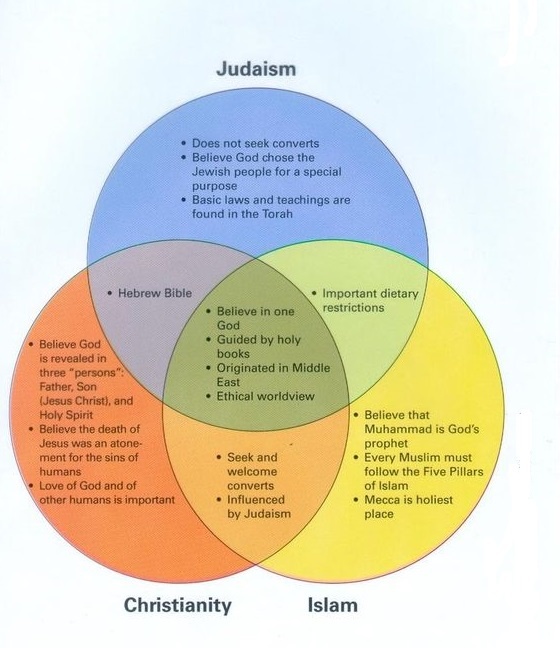What Is An Abrahamic Religion?
An Abrahamic religion is a religion whose people believe that the Hebrew patriarch Abraham (Hebrew: אַבְרָהָם / Arabic: إبراهيم) and his descendants hold an important role in human spiritual development. Abrahamic religions are “monotheistic”, meaning that they believe in just one God. The best-known Abrahamic religions are Judaism, Christianity and Islam.
The Abrahamic religions all claim a direct lineage to Abraham, who is considered a prophet in these religions and is revered for his obedience and dedication to God. These religions are also sometimes called “Western religions” because they originated in the Middle East and have had a profound influence on the Western world.
Why Are These Religions “Abrahamic”?
Judaism, Christianity and Islam are considered Abrahamic religions because they worship the God of Abraham. Because of language differences, they call upon God by different names (Hebrew: אֱלֹהִים / Arabic: الله), but they are one and the same. They believe that God is the Creator of the universe.
Both Judaism and Christianity originated from what is known today as the Occupied Palestinian Territories and Israel, while Islam began in the city of Makkah located in present-day Saudi Arabia. Hence all three religions originate from the Middle East.

Adherents of all three Abrahamic faiths believe that there are prophets that God has sent to teach the people. Judaism, Christianity and Islam share many of the same stories of these prophets in their holy books. Judaism, Christianity and Islam all consider Jerusalem an important holy site, but for different reasons. All three Abrahamic religions believe that followers are required to obey a moral code that has been presented by the prophets.

Key Tenets of the Abrahamic Religions
Judaism
Judaism is the oldest of the Abrahamic religions, with a history dating back nearly 4,000 years. Its primary text is the Torah, and it posits that the Jews are God’s chosen people. Key practices include the observance of the Sabbath and adherence to a set of dietary laws known as kashrut.
Christianity
Christianity emerged in the 1st century CE, centred on the life, teachings, death, and resurrection of Jesus Christ. Christians believe that Jesus is the Son of God and the Messiah prophesied in the Old Testament. The Bible, consisting of the Old and New Testaments, serves as the Christian text. Central rites include baptism and the Eucharist.
Islam
Islam, the youngest of the Abrahamic faiths, emerged in the 7th century CE. It posits that Muhammad is the last prophet of God, who revealed the Quran, Islam’s holy book. Muslims practice the Five Pillars of Islam, which include belief in God and Muhammad as his Prophet, prayer, almsgiving, fasting, and pilgrimage to Makkah.
Interfaith Dialogues and Shared Values
Despite their differences, the Abrahamic religions share fundamental values such as love, kindness, justice, and respect for others. These shared ethical norms often serve as a basis for interfaith dialogue and understanding. Such conversations promote tolerance and mutual respect among followers of these traditions, contributing to peace and harmony in multicultural societies.
Frequently-Asked Questions (FAQs)
How do Abrahamic religions view Abraham?
In Abrahamic religions, Abraham is revered as a patriarch and prophet. These religions believe in a direct lineage to Abraham, admiring his obedience and dedication to God.
In what way do the three Abrahamic religions perceive God, despite language differences?
Although they call upon God by different names due to language differences, Judaism, Christianity, and Islam worship the same entity. They believe this God is the Creator of the universe.
What do the followers of the three Abrahamic faiths believe about prophets?
Adherents of all three Abrahamic faiths believe that there are prophets that God has sent to teach the people. They share many of the same stories of these prophets in their holy books.
How do the Abrahamic religions differ in their central beliefs and practices?
Judaism is centred on the belief that Jews are God’s chosen people and involves practices such as the observance of the Sabbath and kashrut. Christianity revolves around the life, teachings, death, and resurrection of Jesus Christ and rites like baptism and the Eucharist. Islam posits Muhammad as the last prophet of God, who revealed the Quran and involves practices like the Five Pillars of Islam.
How does the city of Jerusalem hold significance in all three Abrahamic religions?
All three Abrahamic religions, Judaism, Christianity, and Islam, consider Jerusalem an important holy site, although for different reasons.
How do the shared values among Abrahamic religions influence societal harmony?
The shared values such as love, kindness, justice, and respect among Abrahamic religions serve as a basis for interfaith dialogue and understanding. This promotes tolerance and mutual respect among followers of these religions, thereby contributing to peace and harmony in multicultural societies.
